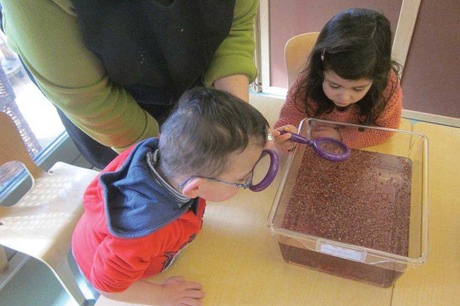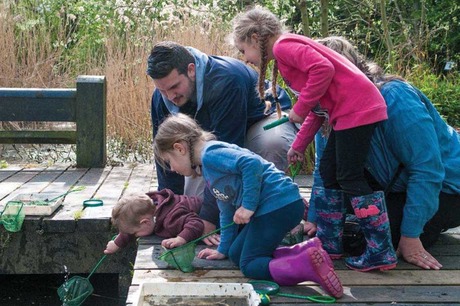scientific ideas accessible to children and families, writes Olivia McCrea-Hedley.

Kate Greenaway Nursery School and Children's Centre, in central London, has beaten 2,000 schools and colleges to become the first early years provider to win the Rolls-Royce Science Prize for being the 'school that captured the spirit of the prize to the absolute best and took it out to the community'.
The prize rewards and recognises excellence in science teaching, as well as providing funding for the winning establishment to develop its educational resources.
'Children are natural scientists, so we encourage them to use their skills of investigation and their determination to find answers,' says Fiona Godfrey, head of Kate Greenaway.
PLAYFUL SCIENCE
Two years ago the nursery launched Playful Science to encourage children to interact with scientific ideas, not only at Kate Greenaway but also throughout the local community.
The project was created after results from the nursery's assessment data showed that Understanding the World was an area in which both staff and children lacked understanding.
First, teacher Joe Knutson and Jan Stillaway, leader of the Playful Science project and former deputy of Kate Greenaway, attended courses for early years practitioners at the National Science Learning Centre.
Based in York, the centre provides continuing professional development for anyone involved in the teaching of science, and it was centre staff who invited the nursery to take part in the Rolls-Royce prize. 'It seemed like a perfect way to develop our practice to create a science project covering skills, attitudes and understanding in science,' says Ms Stillaway.
Ms Godfrey described the project as a 'three-pronged attack', as it is targeted at providing scientific education in three ways:
- - Offering activities based on early science concepts and skills.
- - Starting a forest schools programme.
- - Reaching out to local families with 'Science Saturdays'.

SCIENCE CONCEPTS
The staff at Kate Greenaway aimed to make science accessible for all age groups by researching and planning a range of simple activities.
For example, practitioners introduced the youngest children (up to two years) to the idea of forces and friction, by asking them to whisk up bubbles in a tray of water and washing-up liquid.
To investigate change, they melted butter in a pan, enabling the children to observe the butter move from a solid to liquid state.
They also explored sorting using the senses, which, says Ms Stillaway, is a key skill to be fostered in the early years, as it develops children's understanding of categorisation (an essential science skill).
In one activity, practitioners focused on texture by filling gloves with different materials, such as polystyrene and lentils, which the children then had to sort into matching pairs based on how the gloves felt.
FOREST SCHOOLS
The nursery was aware that due to its central London location, many children had little opportunity to explore the outdoors. So, staff worked with the nearby Camley Street Natural Park to offer a forest school experience for the children.
'If you offer rich experiences, which are open to exploration and problem solving, you will foster skills that are important to science and STEM (science, technology, engineering and mathematics), as well as a lot of other areas of learning,' says Ms Stillaway.
Activities included pond dipping, where the children caught items from the pond in a net and examined them with a magnifying glass. Under careful supervision, the children also built a fire and boiled their own water, so they could see the effect heat has on liquids.
Parents were also invited to attend. Ms Stillaway says, 'We hoped that if we took families to the reserve, they might be inspired to take their children to other natural environments.'

SCIENCE SATURDAYS
On Saturdays, the nursery and children's centre opened its doors to local families with children under the age of six to provide them with the opportunity to learn more about science.
Activities on offer included exploring forces and changes, with a focus on the families becoming involved in the projects. With the help of a member of the British Airways team, staff set up a mock airplane for the children. One parent built an interactive dashboard for the children to use as they started to understand the basic idea of what happens on a plane journey.
'By the last Saturday session, parents completely understood our approach to teaching science and they were taking this method on to educate their children themselves,' says Ms Godfrey.
CHALLENGES
Introducing new methods for teaching early years science did present the nursery with some challenges. The time-consuming project required full commitment from staff. Written and video diaries had to be maintained to record the progress of Playful Science, with session planning also using up time, resources and money.
However, Ms Godfrey says, 'It was important that we stayed focused throughout, but we could see that all the effort was worth it as we watched the children develop over time.'
Full training had to be given to all staff involved. 'I think it's fair to say that we started without much special knowledge. Many of the staff said that they didn't have much confidence in their own understanding of science and their ability to teach it,' says Ms Stillaway.
The team overcame this with brainstorming sessions to pool their knowledge about science and STEM subjects.
'We sometimes did a bit of research to make sure we understood basic concepts to explain them to the children, but a lot of our work was focused on skills and attitudes,' says Ms Stillaway.
'For example, we did lots of work with bubbles, but we didn't need to try to teach children the science of how bubbles are made. Instead, we focused on observing and describing which was the best way to make a change happen.'
IN THE FUTURE
Funding from the Rolls-Royce Science Prize has ensured further investment can be made into nursery equipment. 'We will use the money to rebuild an old water feature in the nursery garden. This will serve as a scientific learning and play tool that the children will be able to interact with,' says Ms Godfrey.
The nursery will also continue with forest schools - the staff believe it is a key aspect of Playful Science that encourages the children's development while also providing a unique and fun experience.
Ms Stillaway adds, 'Through our contact with Rolls-Royce, we also came to understand how important STEM subjects are to the continued success of our society.
'It deepened our confidence and understanding of science concepts and how to offer these to young children. It changed the way we saw science in early education and how this affects children in later life.'
BENEFITS OF THE PROGRAMME
Benefits for children
- Development in the Characteristics of Effective Learning, PSED, CL and PD (including fine motor skills).
- Experience of the natural environment.
- Rich experience of materials that will underpin later learning.
- A greater understanding of their local area.
The nursery found that the children's involvement in 'scientific' activities enhanced their curiosity and interest in other aspects of daily provision.
For example, some babies who were initially uninterested in heuristic play materials began to focus more during these sessions.
There were examples of children under one year persisting in mastering skills such as putting wooden curtain rings on a mug tree for up to 20 minutes at a time.
Forest school work helped a child who previously either didn't speak or only used single words to formulate a whole sentence.
The child explained to a practitioner that she mustn't eat the berries in the park after being taught they were food for the birds. Another child who was very quiet began to speak much more confidently and even began shouting in play after the sessions.
Benefits for parents
- Learning about their local area increased their confidence in visiting places with their children.
- A deeper understanding of how children learn through play activities.
- Gaining some confidence/skills or just pleasure from helping with the projects and contributing to them.
Some parents were surprised to find that their children with complex special educational needs and disabilities could fully participate in forest school - they could walk the 20-minute route there and back without buggies or harnesses, which helped to boost all parents' confidence to do more things with the children.
Playful Science has helped families to discover and enjoy the outdoor spaces in the local community. Parents have been able to share first experiences, such as building a fire and toasting marshmallows.
Benefits for practitioners
- Getting to grips with aspects of the Early Years Foundation Stage.
- Increased confidence in their own practice and expertise.
- Increased understanding of child development and the potential of children.
- Increased confidence and skills in working with families.









